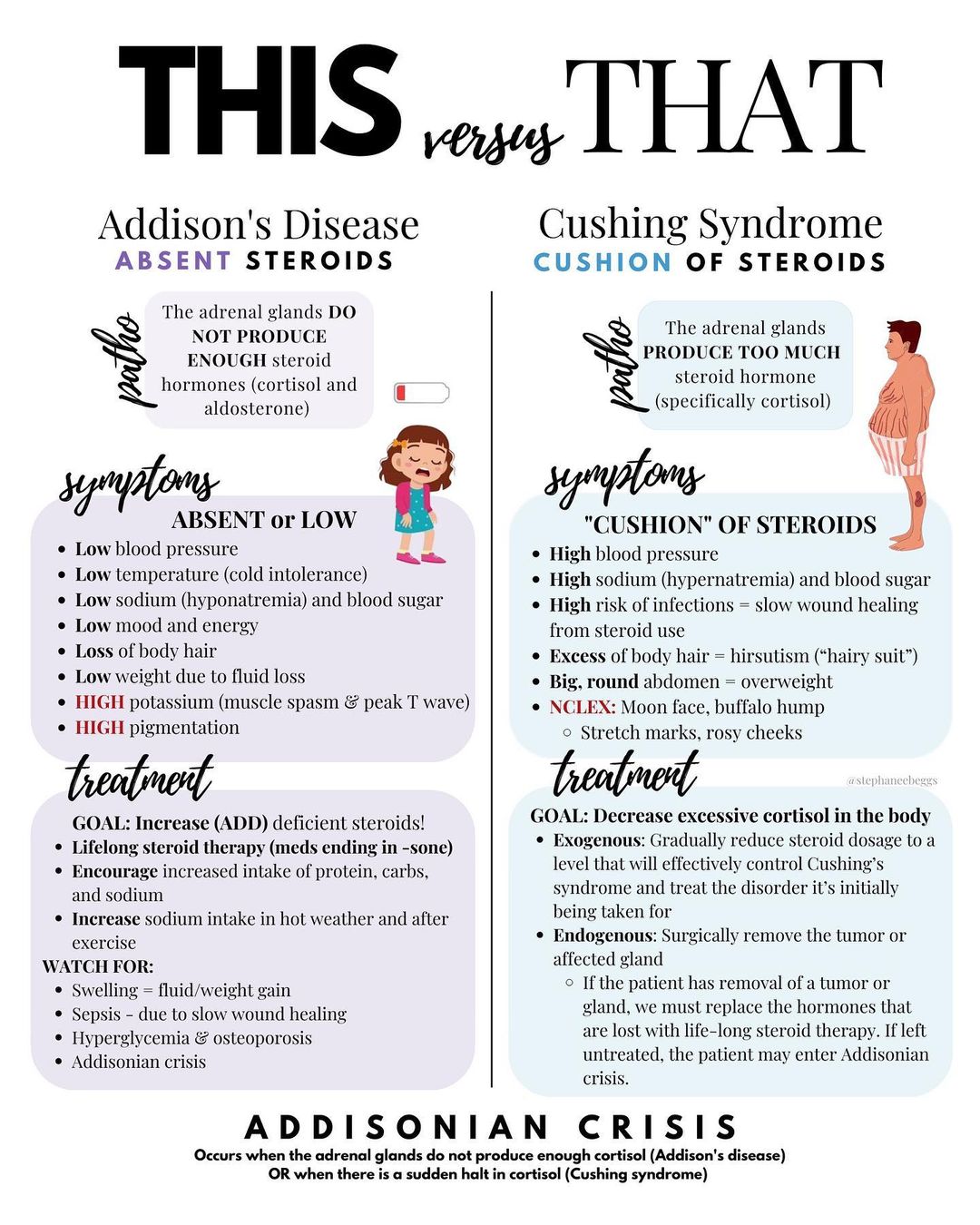Addison's Disease vs Cushing Syndrome, carbohydrates and Psychological Symptoms
Addison’s Disease vs. Cushing’s Syndrome
Both Addison's disease and Cushing’s syndrome involve the adrenal glands but represent opposite ends of the cortisol spectrum.
1. Adrenal Gland Involvement
-
Addison’s Disease (Adrenal Insufficiency):
-
Characterized by underproduction of cortisol (and often aldosterone).
-
Common causes include autoimmune destruction, infections (e.g., tuberculosis), or genetic disorders.
-
Primary adrenal insufficiency may also cause hypercalcaemia, likely due to volume depletion and reduced renal calcium excretion.
-
-
Cushing’s Syndrome:
-
Defined by overproduction of cortisol.
-
Causes include pituitary tumors (Cushing’s disease), adrenal tumors, or prolonged use of corticosteroids (iatrogenic Cushing’s).
-
|
Feature |
Addison’s Disease |
Cushing’s Syndrome |
|
Cortisol Levels |
Low |
High |
|
Aldosterone |
Often low |
Normal or suppressed |
|
Weight Changes |
Weight loss |
Weight gain (especially central obesity) |
|
Blood Pressure |
Low (hypotension) |
High (hypertension) |
|
Skin Changes |
Hyperpigmentation |
Thin skin, easy bruising, purple striae |
|
Electrolyte Changes |
Hyponatremia, hyperkalemia |
Hypokalemia, hyperglycemia |
|
Treatment |
Hormone replacement (hydrocortisone, fludrocortisone) |
Tumor removal, reduce steroid use, medications |
3. Psychological SymptomsAddison’s Disease:
Cushing’s Syndrome:
4. Metabolic and Carbohydrate EffectsCushing’s Syndrome and Carbohydrates:
Addison’s Disease:
| ||||||||||||||||||||||||||
|---|---|---|---|---|---|---|---|---|---|---|---|---|---|---|---|---|---|---|---|---|---|---|---|---|---|---|
Hypercalcaemia in Adrenal Disorders
Symptoms of Hypercalcaemia:
| ||||||||||||||||||||||||||
Diagnosis of Cushing’s SyndromeWhy the Dexamethasone Suppression Test is Important:
| ||||||||||||||||||||||||||
Additional Diagnostic Tests:
| ||||||||||||||||||||||||||
Glucocorticoids – What Are They?
| ||||||||||||||||||||||||||
| ||||||||||||||||||||||||||
Read also: https://swaresearch.blogspot.com/2023/10/cortisol-endocrine-system-hypothalamic.html
Some related links:
Cushing's Syndrome and Disease | Clinical Medicine https://www.youtube.com/watch?v=0rRRmrLmcBM
Mayo Clinic - Addison's Disease: https://www.mayoclinic.org/diseases-conditions/addisons-disease/symptoms-causes/syc-20350293
Mayo Clinic - Cushing's Syndrome: https://www.mayoclinic.org/diseases-conditions/cushings-syndrome/symptoms-causes/syc-20351310
National Institute of Diabetes and Digestive and Kidney Diseases (NIDDK) - Cushing's Syndrome: https://www.niddk.nih.gov/health-information/endocrine-diseases/cushings-syndrome
MedlinePlus - Addison's Disease: https://medlineplus.gov/addisonsdisease.htmlMedlinePlus - Cushing's Syndrome: https://medlineplus.gov/cushingssyndrome.html
MedlinePlus - Cushing's Syndrome: https://medlineplus.gov/cushingssyndrome.html
| © 2025-2030
Sieglinde W. Alexander. All writings by Sieglinde W. Alexander have a fife year
copy right. Library of Congress Card Number: LCN 00-192742 ISBN: 0-9703195-0-9 | ||
|---|---|---|


Comments
Post a Comment